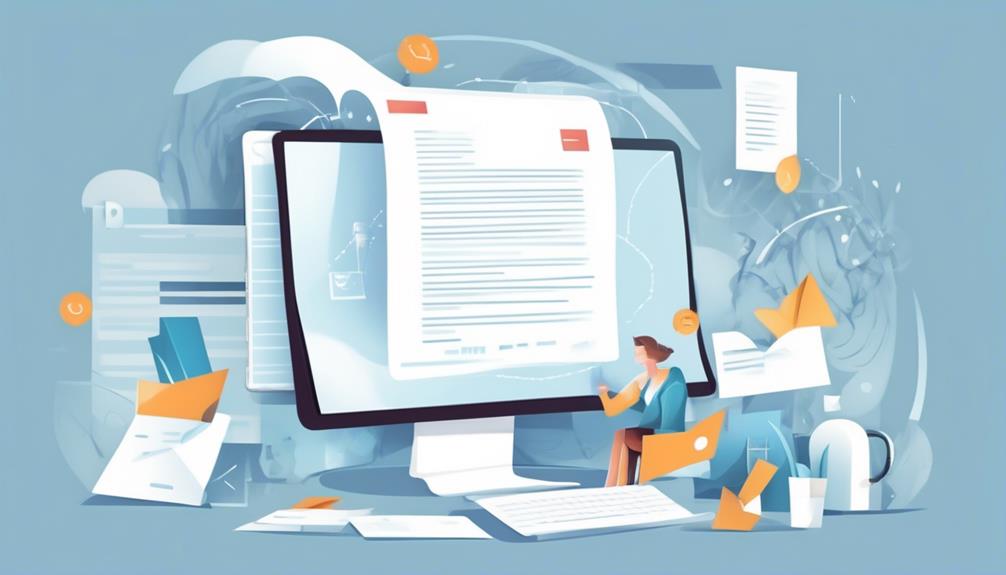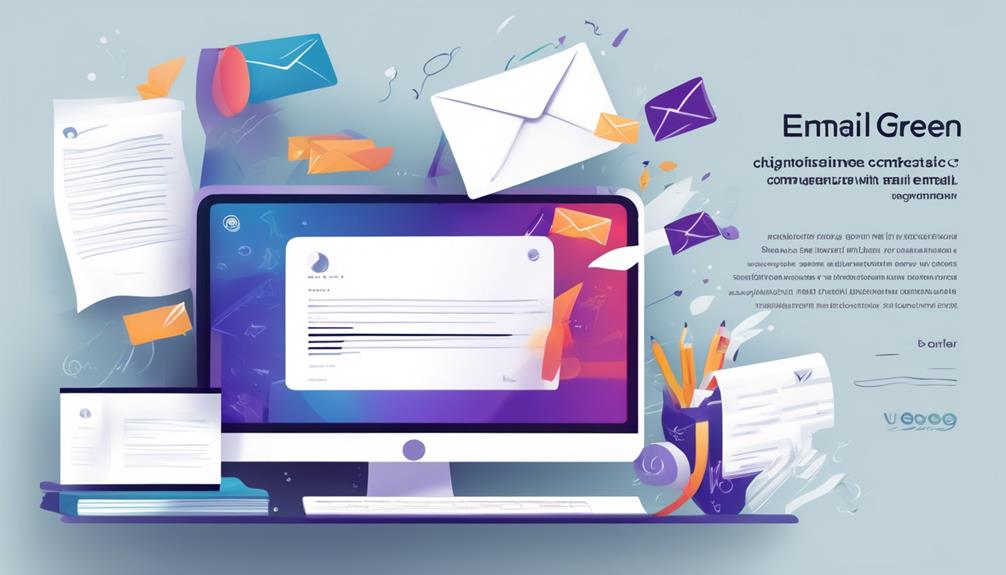We have all experienced the same scenario at some point – dealing with missed appointments. How can we navigate through these situations without harming the professional relationship?
In the world of business, communication is key, and addressing a missed meeting via email is no exception. So, let's dive into the art of crafting a thoughtful and effective email to someone who missed a meeting, ensuring that the message is received with understanding and cooperation.
There are a few essential elements to consider, and we'll explore them together to ensure that your next email sets the right tone and achieves the desired outcome.
Key Takeaways
- Acknowledge the missed meeting and express understanding of the circumstances.
- Offer an alternative and suggest rescheduling the meeting.
- Provide meeting notes or recordings to help the no-show catch up.
- Set clear expectations and consequences for future missed meetings.
Crafting a Polite and Professional Tone
We understand that you were unable to attend the meeting and would like to assist in rescheduling to ensure your valuable input is included.
It's essential to let you know that your presence was missed, and your input would have been valuable in the decisions made.
In the future, we kindly ask that you call or forward your meeting ID if you're unable to attend. This will ensure that we can make the necessary arrangements and keep you informed of any changes.
It's important to keep the lines of communication open to prevent any misunderstandings.
Additionally, we encourage you to regularly check your calendar to ensure that you're aware of upcoming meetings and can make the necessary arrangements to attend.
Your attendance is vital to the success of the team, and we want to ensure that your input is consistently included in our discussions.
Thank you for your attention to this matter, and we look forward to your participation in future meetings.
Essential Components for the Email

Upon recognizing the need for a clear and comprehensive approach in addressing missed meetings, it's essential to outline the key components necessary for crafting an effective email response.
When addressing a missed meeting, it's important to acknowledge the missed meeting and express understanding of the circumstances.
Clearly state the purpose of the email, including the missed meeting and the importance of the content that was discussed.
Offer an alternative, providing an opportunity to reschedule the meeting to ensure that the missed information is conveyed.
Include a brief summary of what was discussed during the meeting, and provide any relevant documents, links, or assets that were shared.
Additionally, it's crucial to set clear expectations and consequences for future missed meetings, emphasizing the importance of attendance and active participation.
Finally, always maintain a polite and professional tone throughout the email, ensuring that the recipient feels supported in making efforts to attend and actively participate in future meetings.
These essential components will contribute to a successful meeting follow-up and effective communication regarding the missed meeting.
Strategies to Minimize Missed Appointments
To minimize missed appointments, promptly sending a follow-up email after the missed meeting is crucial to clarify any confusion and express understanding.
In addition to this, providing meeting notes or recordings can help the no-show catch up on the discussion and decisions made.
Setting clear expectations and consequences for future no-shows is also essential to prevent them from happening.
Moreover, utilizing tools like fellow.app for streamlining communication, sharing agendas, and tracking action items can ensure that everyone stays on the same page and minimize the chances of missed appointments.
Furthermore, considering the use of a meeting scheduler software to send notification emails and reminders can significantly boost participation and reduce the likelihood of missed appointments.
No-Show Email Templates

Rarely do missed appointments go unnoticed in professional settings, and crafting a well-structured no-show email template can be a valuable tool for salvaging business relationships. When a missed meeting occurs, it's essential to send a new email on the day of the missed meeting to address the situation promptly.
In our experience, using a no-show email template can save time and effort, providing a professional and consistent approach to follow-up communication. The template should express understanding for the other party's time constraints and offer available time slots to reschedule the meeting. It's important to convey a willingness to accommodate their schedule and demonstrate flexibility.
Our templates often include a request for a response, ensuring that the recipient is engaged in the rescheduling process. Additionally, mentioning the original meeting agendas and utilizing tools such as Google Calendar to propose new meeting times can streamline the rescheduling process.
When crafting a no-show email, it's crucial to maintain a professional tone, avoid guilt-tripping, and emphasize the intention to move forward positively.
Effective Follow-Up Practices
We prioritize sending a follow-up email promptly after a missed meeting to ensure clarity and provide assistance in rescheduling, fostering effective communication and accountability.
When sending the email, we aim to express understanding and offer help in rescheduling to the individual who missed the meeting. Additionally, we include meeting notes or recordings in the email to help them catch up on the discussion points they missed.
We also set clear expectations and consequences for future no-shows to prevent recurrence.
It's crucial not to wait a few days before sending the no-show follow-up email, as timely communication is key to addressing any misunderstandings or missed information.
By implementing effective follow-up practices, we can maintain a culture of accountability and ensure that all team members are on the same page.
We look forward to hearing about your experiences with these strategies and how they've helped improve the dynamics of missed meetings.
Frequently Asked Questions
What Do You Say to Someone Who Missed a Meeting?
We acknowledge the importance of addressing the situation tactfully. It's crucial to express understanding while emphasizing the significance of the missed meeting. Our goal is to maintain a professional, constructive tone to encourage rescheduling and reinforce the meeting's relevance.
We aim to offer a clear opportunity for remediation and emphasize the value of the participant's attendance. Our approach will prioritize building a positive and respectful relationship.
How Do You Respond to an Email When Someone Misses a Meeting?
When someone misses a meeting, it's important to respond promptly and professionally. We acknowledge the situation and express understanding, offering assistance in rescheduling.
Providing meeting notes or recordings can help the person catch up on what was discussed. It's also crucial to set clear expectations and consequences for future no-shows to prevent them.
This approach helps maintain professionalism while addressing the missed meeting and ensures clarity for all parties involved.
How Do You Email Someone Who Did Not Attend the Meeting?
We promptly address missed meetings with polite and understanding emails, acknowledging the absence and suggesting next steps. Our emails include relevant meeting content, like updated agendas or links, to help the person catch up.
We avoid guilt trips and harassment, highlighting alternative communication channels for future meetings. We may use email templates for a structured format that saves time and ensures a professional approach when following up with no-shows.
How Do You Respond When Someone Doesn't Show up to a Meeting?
When someone doesn't show up to a meeting, we address the situation promptly and professionally. We reach out to express understanding and offer assistance in rescheduling. Providing meeting notes or recordings can help the no-show catch up on what was discussed.
Setting clear expectations and consequences for future no-shows can help prevent them. We wait a few minutes after the scheduled meeting time before sending a no-show email.
Can the same email format be used for writing to a professor and someone who missed a meeting?
When writing a polite email to a professor about an absence, the same format can generally be used when emailing someone who missed a meeting. Begin with a polite greeting, provide an explanation for the absence, and express regret. Be sure to apologize and offer any necessary follow-up information.
Conclusion
In conclusion, it's important to handle missed meetings with understanding and professionalism. Research shows that 60% of employees have missed at least one meeting in the past year, making follow-up emails a common necessity.
By following the tips and templates provided, you can effectively communicate with those who've missed meetings and ensure that important information is still shared.










